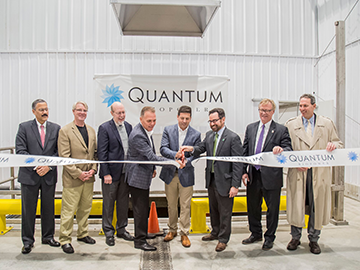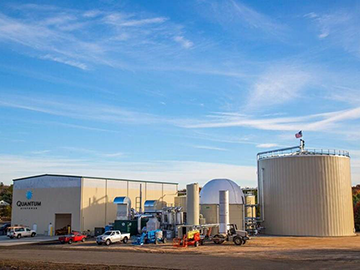
On Tuesday, Yale representatives attended a ribbon cutting ceremony dedicated to Quantum Biopower, Connecticut’s first food waste-to-energy facility in Southington. Beginning operations at the start of 2017, the new facility will help the University expand its composting efforts and further its sustainability goals.
Currently, Yale is sending an estimated 1,000 tons of organic waste to a traditional composting facility in New Milford, CT. The switch to Southington will “substantially decrease the cost of disposal, reduce labor costs, and significantly reduce the environmental impact associated with hauling the material,” explains Bob Ferretti, Yale Waste Systems Manager.
The Southington facility is one-third the distance from campus and can process pre-consumer waste and contamination. That is, businesses can bring items like packaged expired tomatoes straight to the facility without concern for damaging the machines. The facility’s greater tolerance for contamination will help reduce the University’s composting restrictions and fees.
The new facility will also provide multiple regional benefits. According to the Connecticut Solid Waste Management Plan, food waste and compostable paper make up about 770,000 tons of Connecticut’s waste stream. At full capacity, the facility will process 40,000 tons of organic waste from local partners turning it into energy and compost. This effort will support Connecticut’s goal to divert 60 percent of solid waste from disposal by 2024.
The processed waste will create 1.2 megawatts of power. Using an anaerobic digestion process, the facility converts organic waste to biogas - a renewable energy that can be used to generate electricity, natural gas, and transportation fuel. This clean fuel will help avoid CO2 emissions, equivalent to 5,080 tons or taking 1,073 passenger cars off the road per year.

Along with energy, the facility has the potential to create 10,000 tons of organic compost amendments per year from the food waste, providing soil nutrients to farms and growers in Connecticut. The resulting compost will reduce the amount of chemical fertilizers needed.
Ferretti has worked on expanding Yale’s composting capabilities for the past several years. From investigating alternative composting systems to exploring the idea of constructing a digester directly on campus, he has worked to streamline Yale’s organic waste disposal process and reduce costs. Thanks to his efforts, Yale played an integral role in the success of the new facility.
“From the beginning, Quantum looked to Yale as a leader in food waste diversion and sustainability programs. Throughout our long permitting and construction process, Yale has been an interested partner to Quantum and a tremendously helpful resource,” Brian Paganini, Quantum Vice President & Managing Director says. “Now that the facility is built and ready to operate, we could not be more pleased to formalize our partnership, ensuring that Yale’s food waste is used as a fuel to create renewable energy, heat, and compost.”
Yale will be one of Quantum’s flagship partners, providing a consistent feedstock to the facility when it opens.
Virginia Chapman, Director of the Yale Office of Sustainability, is looking forward to expanding the University’s sustainability efforts. “There are multiple groups on campus that have shown interest in composting, but we were unable to expand our program using our previous facility. The switch to the Southington facility will increase the capacity of our composting program and augment our campus waste diversion.”
At the Ribbon Cutting Ceremony, the excitement was palpable. Quantum Biopower will not only provide multiple benefits as a standalone facility, it will pave the way for the construction of more organic waste facilities throughout Connecticut.
Photo Credits: GO Media